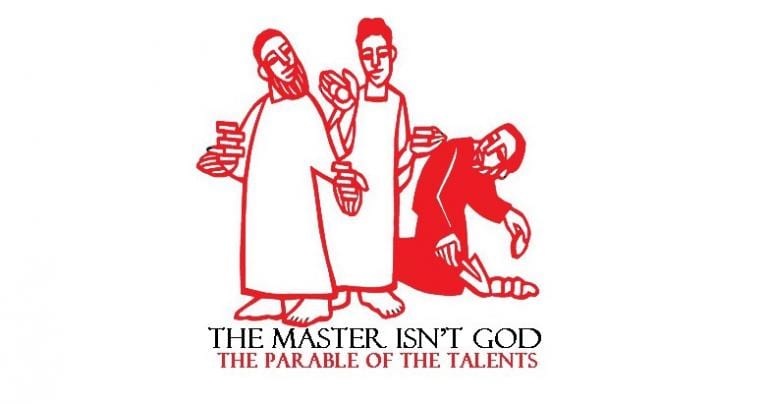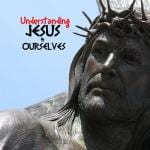
If the Master in the Parable of the Talents represents God, who needs the Devil?
This is a follow-up to my recent post on Sunday’s Gospel of the Parable of the Talents (Matthew 25:14-30). Apparently, it was disturbing to several readers. Good. Now change can happen. Watch the video here:
Offended by the Master
Apparently, I offended a fellow blogger, who decided to “call me out” on the Patheos Facebook page, claiming that I “completely misunderstood and misrepresented” the parable. He next proceeded to present a typical allegory-gone-wild treatment of the passage, assured that this was the correct understanding.
Now I would have let that go because the argument stands well enough, as presented in the recent controversial (???) post. But then, this blogger seemed to suggest that I called God a douche. Just to clear things up, I did not say that God was a douche. Instead, I called the Master in the Matthean story a douche because he was. In fact, I was being charitable.
Almost every Catholic I know would benefit from a solid course on Jesus’ parables. One thing we could use a refresher on is the difference between parables and allegories. The Bible Alive YouTube channel link above leads to a playlist that serves as a parable workshop. Take your time to thoroughly watch the playlist, a treasury of suitable lessons, and the mistaken notions of my fellow blogger won’t be yours.
I’m going to keep this short and sweet. Again I will be following the insights of Dr. Richard Rohrbaugh, Context Group biblical scholar. My brother’s surrejoinder rests on his unproven presumption that “The master who ‘reaps where he did not sow, and gathers where he scattered no seed,’ is in fact, God.” I will, therefore, keep my focus on the Master while touching on a few other elements.
Who Would View the Master as Godlike?
What is the only possible way that the Master can be viewed as honorable, and such a parable can be seen as “good news”? ANSWER: only if the storyteller and audience are wealthy and thus hold the greedy-rich vantage point and value system. Because only greedy elites would deem the Master a good man and the parable as “good news.” Therefore, to estimate the Master as righteous and the story as gospel demands that both storyteller and audience wield coercive force and use it to extract what rightfully belongs to others for themselves. Consequently, if this were so, Jesus, the storyteller, and his audience would be the very opposite of what Ben Sira praises (Sirach 31:8–11).
How ironic that Western interpreters, including U.S. Catholics, overwhelmingly assume that the Master is an honest person and that his actions are entirely justified. Rohrbaugh wonders what could bring Gospel readers to this conclusion. Is it narrative logic that leads readers there, nudging them along so that they will adopt the viewpoint of the Master? Rohrbaugh offers the far more likely scenario that Western acculturation does this.
As Rohrbaugh and other Context Group scholars stress, Jesus is not American. And he cautions us against any Jesus we might concoct who is congenial to American values. Thus we must also beware any and all Gospels congenial to American values as well. Does it tickle the American ear? If so, it probably ain’t Jesus. Because Jesus was a starving Galilean peasant artisan speaking to mostly fellow starving peasants. And theirs was a limited-good world. Therefore, Jesus and friends would view any master receiving 1,000 percent on his money as despicably shameful and greedy. Ultimately, Jesus would call him a “fool” (Luke 12:16–21).
Close Examination of the Master
In Jesus’ day, WHO could see the Parable of the Talents (Matthew 25:14-30) or its variant, the Parable of the Coins (Luke 19:12-27), as “good news”? Who would say, “Oh sure, it’s obvious that the Master is an analog for GOD!”
Look carefully at the Master. He is a greedy villain, a ruthless, shameless elite. The Master is a usurer who lays out his money to vile moneylenders and agents. He threatens and interrogates his slaves and scrutinizes the ledgers. This is a stand-in for God? With such a God, who needs the Devil? And how can this be the Gospel/“good news”? No, thank you! Who needs such a wretched God and gospel?
The Two “Saints”
And let’s look at the supposed “saints” or holy men of the story. Those would be slaves nos. 1 and 2, yes? But how could Jesus or his peasant listeners ever think of these two reprobates as heroes? While they both may seem “venturesome” and “industrious” to us go-go-go! Do-do-do! Americans, don’t forget they are characters from a Middle Eastern peasant story, and inspiration happens in.
How would Galilean peasants ardently believing in the Limited Good ever be convinced that these two were heroes? The ONLY people who COULD see this sorry pair as heroes would be wicked folk. Admirers of these two slaves would believe it right to amass wealth by contriving to get a more extensive and UNJUST share of the limited pie, thereby stealing from the poor!
Was the Third Slave Really Wicked?
And who in Jesus’ day would imagine the poor third slave (the one who added nothing) as “wicked”? Only people with a greedy, elitist mentality. Certainly not peasants like Jesus and the majority of his audience.
But go to any Western sermon or homily, any preacher or priest from the West, and you will hear nothing but condemnation of the third slave. The universal cry is, “he’s a failure!”
But to Jesus and his fellow peasants, the world was very different than ours. As Rohrbaugh and others illustrate, they believed that no human power could increase the size of the Limited Good pie. And they also thought that the rich who did not share their surplus like stewards and patrons were greedy thieves without mercy. They believed that an honorable man only sought out what was already his, and no more.
The Master and Parable: Horrific
Think about it, friends. To a Galilean peasant, this parable would have been a tale of terror. How could they accept that it was a description of the Kingdom of God?
If this story really described the Kingdom of God, then it would have confirmed the worst nightmares of peasant Israelites. Because it would mean that God and his reign worked precisely as did their daily experience. In other words, the powerful take advantage and destroy the weak and get rewarded for it.
Wicked Master, Righteous Slave
American Catholics, please carefully examine the actions of the third slave. He buries his Master’s talent for safekeeping. According to peasants like Jesus and the vast majority of his listeners, this is just what an honorable person ought to do.
Commenting on Exodus 22:7, guess what Josephus says happens to a depositary should he lose the smallest portion of a deposit? Then he must face a tribunal with seven judges and swear oaths that he has neither used any of it nor lost it through any malice or intent (Antiquities 4.285–87).
What does the third slave do? He follows rabbinic law to the letter, burying it in the ground. This is the proper, honorable course. Rabbis would later rule that one burying an entrusted amount was not responsible for any loss (b. Baba Mezi’a 42; m. Baba Batra 4:8).
Fearing the Godless
We must not forget that the third slave acknowledges that he is “afraid.” “Luke” specifies that the slave is afraid of the Master. Why? Because the Master is said to be a hard man. “Matthew” uses the term σκληρός to describe the Master. Rohrbaugh explains that it means harsh or cruel or merciless. In “Luke,” the Master is said to be αὐστηρός, meaning strict or exacting.
Folks, following Rohrbaugh and the Context Group, this evil person isn’t God or an analog for GOd. He’s just the greedy Mediterranean person Plutarch describes, someone who continually interrogates slaves and inspects the ledgers only with profit as his sole concern. This is someone who “reaps where he did not sow” and gathers “where he did not scatter seed.” What a perfect image of a crook.
We are simply not reading this story correctly.
















